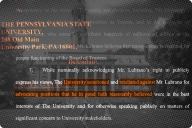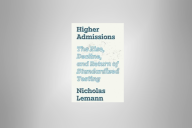You have /5 articles left.
Sign up for a free account or log in.
A postdoctoral researcher who says she was retaliated against for complaining about pregnancy discrimination still has a job, her union announced Monday.
Previously, the University of California, Los Angeles, told Sandra Koch, the neurobiology postdoc, that her appointment there would end on June 30. That’s even though she had secured her own funding and her principal investigator wanted her to stay on in her lab.
UCLA blames the recent dispute about Koch’s future there on the terms of a prior settlement about her bias claim. It denies having discriminated or retaliated against Koch in any way.
Anke Schennink, president of Koch’s United Auto Workers-affiliated union, doesn’t believe that.
“It didn’t make sense to us and still doesn’t make sense to us -- there was never any good explanation,” she said, adding that it's unheard of for universities to deny postdocs with their own funding and a willing supervisor a place on campus.
In the "bigger picture," Schennink said, "this is what people who bring up discrimination issues are afraid of, that it will haunt them and be detrimental to their careers. It’s why a lot of people don’t ever bring up these issues.”
Koch, who was not immediately available for an interview, has said publicly that she was effectively fired from her previous lab at UCLA after she told her former supervisor that she was pregnant, in 2017. She filed a grievance with her union and also with the university’s sexual harassment office and reached an agreement allowing her to switch labs and principal investigators.
Anecdotes about pregnancy discrimination in academe are widespread, especially in the natural sciences. And postdocs are among the most vulnerable academic workers because universities have been slow to adopt formal work-life policies for them. Sometimes a pregnant postdoc’s fate depends on the whims of her PI.
That wasn’t the case for Koch, however, as postdocs across the UC system are unionized -- still rare in academe -- and enjoy certain protections. Among them is a parental leave policy, won in 2016.
In a new lab, working under fellowship funding and a supportive supervisor, Koch thought her complaint was behind her. But she says that human resources officials recently refused to renew her appointment beyond this month. A German citizen, Koch’s immigration status is linked to her employment terms, meaning she likely would have had to leave the country if UCLA hadn't changed its position.
"Before now, walking away from a funded, possibly groundbreaking project was all but unthinkable," Koch wrote in a Medium post about her situation late last month. Yet "I will mostly likely be packing up and leaving my work on a dusty shelf."
Koch’s supporters soon launched a petition for her reinstatement, gathering 3,000 signatures in three days. The editorial board of the Daily Bruin student newspaper also published a piece in support of Koch, saying that "what’s shocking about UCLA’s course of action is its audacity: that a well-funded, well-researched and well-read postdoctoral student wouldn’t even be granted an extension for her valuable work because she dared to be pregnant."
An on-campus demonstration was planned for last week. But the university extended her appointment before it began.
“It’s been an emotional journey, but I am ecstatic to be able to stay in my research career that I love, and with my family in this country,” Koch said in a statement. “I want to thank everyone who joined me in taking a stand against the injustice I experienced at UCLA.”
Schennink said pregnancy discrimination against postdocs and retaliation are open secrets in academe. One way to right the “imbalance” between tenured faculty members and more vulnerable academic workers would be shoring up protections against both, she said.
UCLA said in a statement that it maintains an “inclusive environment where all students, faculty and staff are free from discrimination or retaliation.” A dispute arose regarding Koch's "eligibility for reappointment under the terms” of the prior agreement, it said.
This issue is now resolved and UCLA is “pleased that it was able to reach an amicable resolution” with Koch.
A 2017 survey of hundreds of postdocs’ pregnancy and child-rearing experiences by the National Postdoctoral Association and the Pregnant Scholar project of the Center for WorkLife Law at the University of California, Hastings, found many postdocs experienced work climate issues both before and after becoming parents. Some reported fearing asking for pregnancy accommodations, even if they needed them for health reasons. The survey also revealed a lack of access to paid parental leave, pressures to return to work early and extra stressors for parents of color.
Jessica Lee, staff attorney at the Center for WorkLife law, said there are no clear data on how common it is to face retaliation as a postdoc. In the workforce generally, however, she said, retaliation is common. Some 40 percent of legal cases filed under Title VII of the Civil Rights Act of 1964 against discrimination in employment and retaliation include charges of relation, she added. And retaliation is illegal in both public and private settings.
“Among the many postdocs and graduate students I have counseled through our nationwide hotline, the fear of retaliation is overwhelming and ever-present,” Lee said. “Adding to the problem is that retaliation can take many forms, including concrete actions like firing -- as well as the less tangible loss of publication opportunities or reputational damage.”
Lee said the biggest risk factor for discrimination and retaliation is when a single professor has complete control over a postdoc’s or graduate student’s professional life, with limited accountability. So policies about postdoc hiring, performance evaluations and dismissals can help — as can parental leave and pregnancy accommodation policies.
The most important piece? “Because of the wide power differential between professors and students or postdocs, a robust and independent complaint process is essential,” Lee said.









